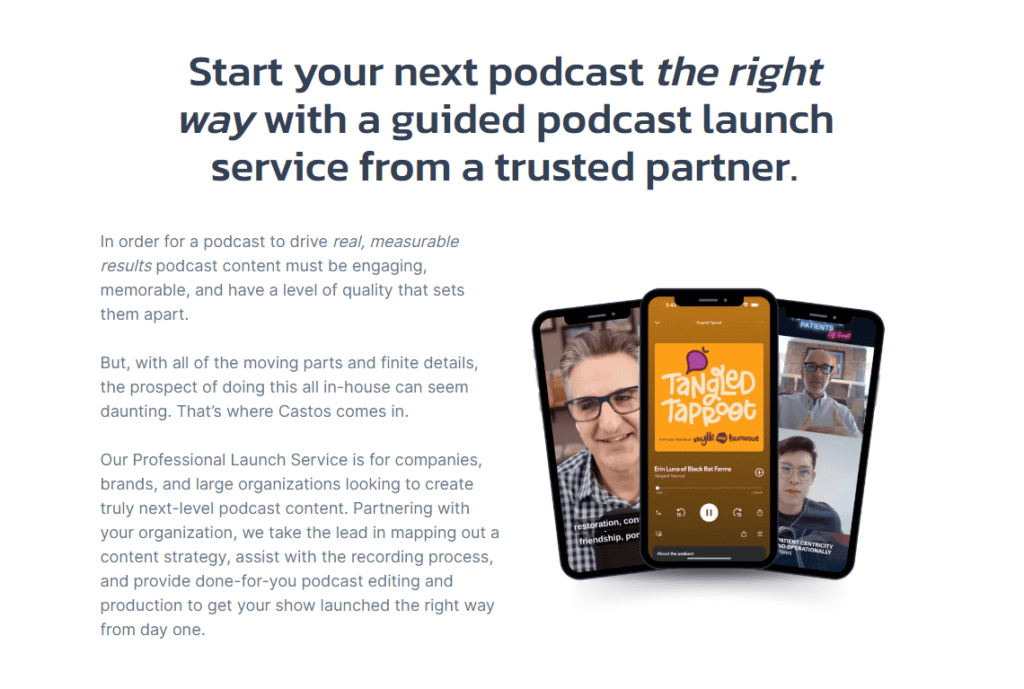Are you a brand that wants to run a podcast, but doesn’t have the time or expertise to manage it yourself? Or maybe you’re a podcaster that loves building new shows for people and brands. If you’re in either position, white label podcasting could be for you.
What is White Label Podcasting?
White label podcasting is a service where a third-party provider creates, produces, and manages a podcast on behalf of another brand or business.
The podcast is branded under the business’s name, logo, and identity, making it appear as if the company itself has developed the podcast content.
White label podcasting allows brands to leverage professional podcast production expertise without having to invest in building their own podcasting infrastructure from scratch.
Benefits of White Label Podcasting for Brands
If you’re a brand, these are the benefits you’ll get for buying white label podcasting services:
Brand Customization: White label podcasting lets you maintain your unique identity throughout the podcast. From custom intros and outros to branded cover art and promotional materials, every aspect of the podcast can be tailored to reflect your brand’s voice and aesthetic.
Time and Resource Efficiency: Creating and managing a podcast in-house requires a lot of time and resources, including equipment, software, and skilled personnel. White label podcasting handles everything so you can focus on your core activities while still benefiting from quality podcast content.
Expertise and Quality: White label podcasers bring professional expertise to the table. They have experienced scriptwriters, hosts, sound engineers, and editors who ensure that the podcast is of the highest quality.
Focus on Core Competencies: By outsourcing podcast production, you can concentrate on what you do best: running your business. This lets you allocate your resources and attention to areas that directly impact your bottom line, such as products, sales, and customer service.
Benefits of White Label Podcasting for Podcast Creators
If you’re a podcater who loves launching shows, here are the benefits of providing white label podcasting services to clients:
Expanded Revenue Streams: Offering white label podcasting services opens up new revenue opportunities. This is a great way to fund your other projects.
Consistent Workflow: White label podcasting can provide you with a more consistent and predictable workflow compared to traditional podcasting, which often relies on fluctuating advertising revenues and sponsorships..
Leveraging Existing Skills and Resources: If you already possess the necessary skills and equipment for producing high-quality content, you can maximize your existing resources.
Building Long-Term Relationships: White label podcasting often involves ongoing projects and collaborations. These sustained partnerships can provide continuous work and revenue.
Upselling and Cross-Selling Services: You can upsell and cross-sell additional services to their white label clients, such as marketing and promotion, analytics reporting, social media management, and more.
Why is it Called White Label?
“White label” is an old term that refers to a practice where brands would put white labels on unlabeled products.
This allows multiple brands to sell the same products under their own name. You’ll find a lot of white labeling in the arts and service sectors as well.
No, this doesn’t mean that other brands will put their name on the same podcast content, so the term isn’t entirely accurate. In the case of a white label podcast, someone else makes it, but you “sell” it as your own.
How to Find White Label Podcasting for Your Brand
If you’re a brand looking for white label podcasting services, follow these steps to find a vendor that meets your needs:
Step 1. Hire an Experienced Podcaster
You’re buying expertise so you don’t have to manage the project yourself, so it doesn’t make sense to hire an amateur. Look for podcasters with a proven record of launching quality shows that drive listener engagement. Any potential vendor should be able to show you hard data on their past success.
Step 2: Understand the Service Level
Make sure you understand exactly what each potential white label podcasting vendor includes in their package. Some offer planning, but won’t produce the episodes themselves. Some will handle podcast hosting, but expect you to find your own guests.
It varies a lot, so make sure you’re comfortable with what you’re getting.
Step 3: Determine Your Level of Involvement
As the brand, you’ll have to be involved in some way. You might be heavily involved by approaching content outlines and guests, submitting notes, or even appearing on the show often. Or you might simply meet once a quarter to talk high level strategy and leave the rest to the hired podcaster.
However you decide to be involved, make sure potential white label podcasting vendors are willing to work with you.
Step 4: Ask About Promotion
Your white label podcaster will produce your show, but do they promote it as well? Or is that left to you and your organization? If promotion is your responsibility, will the podcaster provide assets or tools to help you build an audience? How will you coordinate the host’s in-episode marketing with your efforts?
Make sure to ask these questions before choosing a vendor. Read our podcast promotion guide to understand what it takes to promote a show.
Step 5: Set Up Data Sharing
A white label podcaster should be willing to share all of the data from the show so you can make your own strategic decisions. This might mean giving you access to the podcast hosting account where the episodes are stored and distributed.
Step 6: Consider the Pricing
Obviously price will be a concern. How much a podcast costs depends on a lot of factors, so it’s important to have clarity with your vendor regarding what you get for your money and what (if any) components of the production you are responsible for.
Read our guide on creating a podcast budget before you talk numbers with your vendor.
How to Offer White Label Podcasting Services
If you’re an experienced podcaster who wants to get into white labeling, follow these steps:
Step 1: Identify a Target Audience
This is the most important part of your journey. First, you have to focus on companies who can afford to outsource their entire podcast development. This is a non-trivial expense, so many companies can’t afford it.
Furthermore, focus on the companies who podcast in niches where you can add value. For example, if you have a background in business management, you could podcast about business growth, human resources, recruiting, etc.
But it wouldn’t make sense to try to podcast about fishing or healthy eating. You could create content around those topics, but it wouldn’t be efficient or profitable for you.
Step 2: Document Your Process/Workflow
Whenever you intend to do something multiple times, it’s always good to create a documented workflow that you can follow. The goal is to minimize the amount of work you have to perform each time and ensure that nothing gets forgotten.
This doesn’t have to be complicated. Simple checklists will do. You might have a “setup checklist,” a “launch checklist,” and a “marketing checklist.”
Step 3: Choose Your Tools
All creative endeavors require a toolbox full of valuable tools that you will use throughout your projects. Identify the simplest tools that you can use to produce the elements of your podcasts as quickly as possible.
For instance, you might settle on Canva for podcast artwork. You might opt for Audacity and Descript for recording and editing. And you’ll undoubtedly need a podcast platform to host your content.
Action
The Castos Podcast Cover Art Creator is an entirely free tool that lets you create a stunning cover image for your podcast with just a few clicks. No design skills required. Start Your Cover Art Design.
Step 4: Automate Everything You Can
It takes steps to automate as much of the podcasting process as possible. Every task you have software complete for you increases your profitability with that client. It also allows you to scale up your operation by producing more podcasts.
For instance, if you offer marketing services as part of your white label podcasting package, use automated tools to handle social media scheduling and engagement. You can even use AI writing tools to draft content.
Step 5: Organize Deals with Vendors
If you plan to use any vendor services or tools on a regular basis, it’s important that you don’t pay the sticker price. Contact their sales team and organize a deal for frequent users.
For example, you may decide to outsource your audio editing to another service so you can focus on the content. Find a vendor you like and arrange a deal to use them exclusively.
Step 6: Set Clear Goals, Timelines, and Deliverables
When clients Outsource tasks to third-party vendors, they typically require clear goals, timelines, and deliverables. They want to know what you will provide and how you expect the show to perform. So it’s very important to be very transparent about this information.
For example, you may promise to deliver a new, polished episode every Monday morning for their review. You should also set a timeline for producing show notes, updating the podcast website, promoting the episode, etc. You’ll need to create similar timelines for finding guests, conducting interviews, drafting episode notes, and more.
Alternatives to White Label Podcasting Services
White label podcasting is a complete, done for you service that manages the entire podcasting process. But many brands don’t need that much help. They just need a few services to help them with a few components of podcasting.
Audio Editing
Audio editing is one of the most tedious parts of producing a podcast. It requires some technical skills and experience with editing software that a lot of people lack. So it’s no surprise that this is a commonly outsourced task.
At Castos, we offer on-demand podcast editing that will elevate your brand and make everything else your business does that much easier.
How it works:
- You send us your raw audio files and any edit notes for the episode.
- We edit, mix & master (and other technical aspects) to make your show sound great on all platforms. This includes removing background noise, adjusting volumes, adding your intro and outro, and including any sound effects that you require.
- Once you approve your final edit, we can publish it directly or send you the file.
It all happens in three business days! Learn more about Castos Productions.
Guest Booking
Guest booking is challenging if you don’t already have a wide network of potential guests. It involves a lot of cold outreach that can be frustrating for new podcasters.
In many cases, it makes more sense to outsource this to a guest booking specialist that has a large contact list of potential contributors and knows how to find people in your niche.
Alternatively, there are several guest booking platforms that put podcasters and guests together. Here are some options:
Launch Services
If you just need help getting your podcast off the ground, consider purchasing a launch service. This service helps you get all of the moving parts in order so you can get to content production quickly.
At Castos, we offer a launch service for brands and organizations looking to create truly next-level podcast content. Skip the frustrating parts, let us guide you through the entire process. This includes:
- Content strategy mapping call
- Pre-recording sound and setup test
- Recording professional grade voiceover intro/outro segments
- Create an eye-catching cover image for your show
- Sourcing royalty-free music for each episode
- Launch time distribution setup
- Media hosting and RSS feed setup
- Marketing pre-launch consultation with our team
Learn more about Castos’ Professional Podcast Launch Service.

Production Support
Producing, publishing, and promoting a podcast includes a lot of little tasks that can eat away at your time. It’s easy to get lost in these activities and rob yourself of the time and energy you need to produce great content.
The simplest solution is to either delegate the tasks to someone else in your organization or hire a virtual assistant who can complete these tasks for you. All you have to do is document them clearly with all the relevant steps for the assistant to follow.
For example, you might have an assistant produce show notes, publish episodes to your website, communicate with guests, or other aspects of podcasting.
Marketing/Promotions
Promoting your podcast is a big step. Once you become comfortable producing episodes, this is where you’ll spend most of your time. Between marketing strategies, social media, email marketing, guest appearances on other shows, and exposing your show to wider audiences, there’s a lot to do.
The easiest solution is to hire a podcast marketing agency that has clients that are also in your niche. This makes it easy for them to set up cross-promotional opportunities with other shows. Another option is to join a podcast network that offers similar marketing benefits.
Whomever you choose to promote your show (which may include your white label podcaster), make sure they outline a set of clear deliverables for each week, month, or episode. Then be sure to check that they’re delivering on their promises and getting results.
White Label Podcasting FAQs
Still have some questions about white label podcast services? Here are some FAQs that might help.
Can I customize the podcast content to fit my brand’s voice and message?
Yes, white label podcasting services typically offer full customization options, allowing you to tailor the content, style, and branding to match your brand’s identity and objectives.
How do I measure the success of my white label podcast?
Success can be measured through analytics and reporting provided by the service, including listener demographics, engagement metrics, and episode performance data.
Is white label podcasting cost-effective for small businesses?
Yes, it can be more cost-effective than building an in-house podcasting team, as it reduces the need for significant upfront investments in equipment and personnel.
What types of businesses can benefit from white label podcasting?
A wide range of businesses, including corporate brands, educational institutions, healthcare providers, and nonprofits, can benefit from white label podcasting by enhancing their content marketing and audience engagement strategies.
Can I use my own team for some aspects of the podcast, like hosting or marketing?
Yes, many white label podcasting services offer flexible arrangements that allow you to use your own team for certain aspects while they handle the rest.
What is the typical turnaround time for producing a white label podcast episode?
Turnaround time can vary based on the complexity of the content, but most white label podcasting services can produce and deliver a high-quality episode within a few weeks.


